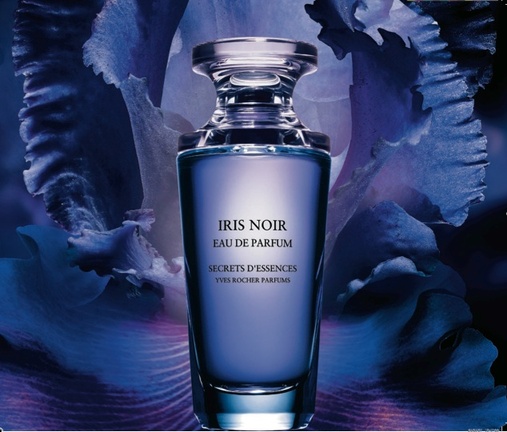Iris Noir by Yves Rocher: The Reassuring Smell of The Middle Class {Perfume Short (Review)} {Scented Thoughts} {New Fragrance}

Iris Noir (Black Iris) by Yves Rocher is the latest and third installment in the brand's more upscale collection of perfumes called Secrets d'Essences (Secrets of Essences). This new perfume is already out in France but US-based customers will have to wait until the beginning of 2008 to be able to purchase it.
Iris Noir comes after Voile d'Ambre and Rose Absolue. Each fragrance is dedicated to the showcasing of one key exceptionally sourced ingredient be it amber, rose, or iris. The stress for the collection is put on both this use of rarer ingredients and the partnership with "talented perfumers" although it must be noted that Yves Rocher has always had a policy of recruiting excellent and even great perfumers, such as Sophia Grojsman, Annick Ménardo, and Francis Kurkdjian, even for their more mundanely presented fragrance creations. According to Osmoz, 86% of natural ingredients were included in the composition.......
The start of Iris Noir is a bit décalé, as if taking the path of a diagonal line rather than a straight one, opening on the less expected notes of coriander allied with bergamot, an accord whose intensity makes it smell like a note of nail polish while the more wistful, matte accents of iris start uncoiling together with a rosy undertone. As the complex, both powdery and subtly aqueous facets, of the iris impression progress it becomes counterbalanced by a fruity dark blackcurrant note offering a jam-y texture with a dash of tartness in it. The fruity impression would be due in part to ambrette seed; it also has some dark plummy undertones. The iris smell is reminiscent of that of the dual starchy and aqueous soft smell of water chestnuts. The liquid and powdery iris casts off some metallic reflections with the ambergris, but in a rather attenuated fashion. As deeper notes emerge the impression becomes more densely chocolate-y, a bit flour-y with the vanilla and tonka bean. The dry-down is woodsy, sweet, resinous, and balmy with a soft note of leafy patchouli coming to the fore together with a very present smoky tonka bean note and what smells to us like the piquancy of sandalwood and perhaps some cedarwood although they are not mentioned.
Iris Noir smells rather complex, pleasant and even good although we find in the end that there could be more of the expensive iris butter included, and perhaps there will be more in the pure parfum version which is not out yet even in France. It feels like the iris is a bit thin and elusive at times, a bit overwhelmed by the woods.
One is moreover struck by a certain class-coded accord often found in middle-market perfumes in France, even in those that present themselves as more refined and dainty. We cannot quite put our finger on it yet, as this is an intuitive take, but it seems that marketers know that a large chunk of the population has certain predictable tastes and that they reproduce this taste in their perfumes. Rose Divine by Céline Ellena for Isabel Derroisné is another example of aspiration for luxury and the rare coupled with a toning down of the aristocratic overtones of the enterprise in the very perfume itself which presents this very "middle-class accord" allied with the showcasing of a rarer ingredient, Rose Centifolia. At least this is the immediate association we make when we smell the perfume. It does not smell cheap, it smells very middle-class. A certain sharp and even pointy soapy and sweaty musky feel in particular seem to be sought out.
It is much more common to see straightforward aspirational fragrances being created which smell unabashedly expensive and rich. It seems that in certain cases a more ambiguous result is sought out which combines the ideal of aspiration towards luxury with a desire to not intimidate and the wish to preserve a more real feel of familiarity and ingrained taste, apparently. If the effect is somewhat less subtle and stereotypical on the olfactory level, it is quite subtle on the sociological one. We already know that taste in paintings for example is class-coded, but perfumes seemed to have been left alone as they are precisely considered to be affordable luxury that virtually anyone can buy and relate to through, one would assume, people's experiences with the natural olfactory environment.
Visibly an effort at democratizing the smell of iris was conducted here by the fragrance developing team as they perhaps know that the majority of the Yves Rocher audience would not go for an aloof iris that might, possibly, awaken social anxieties. It is therefore revelatory that they made the explicit comment about the iris that "to moderate what could be perceived as excessive pride, the fruity note appears simultaneously,"(pour tempérer ce qui peut être perçu comme un trop plein d'orgueil, la note fruitée apparaît
simultanément.)
Iris Noir was therefore made to smell aspirational in a realistic and reassuring sense. It reinforces for us the image of Yves Rocher as a socially conscious brand although it would be interesting to evaluate further the merits of that approach.
We also learn that fruity notes might be used by perfumers to make everyone feel comfortable, hence their current popularity. Gourmand notes also would, of course, participate in the same logic.
Rose Absolue in the same collection is the one that seems to have played down the "middle-class accord" most although it is there as well.
Top notes are bergamot and coriander. Heart notes are iris, rosy notes, floral notes. Base notes are patchouli, tonka bean, and ambrette seed.
You can buy the perfume here if you are in France or have friends or relatives there that could procure it for you.
You can read about the popular iris perfume trend here.
(Source: Yves Rocher *advance* press release in the US; please do not pilfer image even with a link as it is not completely edited)









Dear M.-H.,
The idea of a "middle-class" accord is a fascinating notion: I don't believe it's ever been put in words, but it would be very logical for Yves Rocher to exploit it. Their discourse is very clear about this, apparently. It seems to me that Guerlain's Iris Ganache is also an attempt to tame the haughtiness of iris, albeit in a more "exclusive" fashion. I'd be curious to know what other scents, from different houses, you consider to have that "middle-class" accord?
86% of natural ingredients were included in the composition.......
It is written on the packaging and even some natural raw materials are indicated!
It is something new because it's not marketing but labeling. The 86% written according to the french law is sort of certification...so it's true, not invention. But 86 natural doesn't mean 86% orris absolute but more...50% bergamot/orange and a very few other expensive materials.
They try to come closer to bio/organic labels and I appreciated this clear position/statement of Yves Rocher. Other luxury brands didn't certified so clear about their natural ingredients. :))
Dear D,
I would have to think more about that, I have a couple of candidates in mind but would need to re-sniff. It's probably linked with the smell of other body care products too in the middle market and loyalty to perceived good smells that one would have to re-situate in a sociological context.
Gourmand notes might have not only a comforting meaning but a message linked with perceived olfactory hierarchies.
The almond accord in L'Instant Magic also has a "common denominator" vibe about it.
Yes, I think that Yves Rocher tries to be an ethical brand.
Dear M-H,
what an interesting post! Thank you.
First of all, Yves Rocher has done marvels on simple floral perfumes (their Gardenia is perfection), so hopes for this one are rather high.
Secondly, they have proudly stated that they honour the ethical approach, meaning they try to re-create aromas of nature when their harvest is detrimental to the latter. And I have to agree that the 86% mentioned does not of course apply to iris per se, but to the total which could very well be like Octavian says.
Thirdly, the sociological aspect of a middle-class perfume that aims to be generally pleasing and recognised as -exactly- "nice perfume" is indeed very apt.
I wonder how you came up with this idea, as usually brands try to inject more of an expensive-smelling angle into their creations. Even in this case YR is trying for an upscale line within the brand ;-)
However besides marketing and claims, those fragrances do smell rather...middle-class. Of a bourgeoisie mindframe, so to speak.
Very interesting concept, to be sure.
Dear Helg,
This idea is purely personal, intuitive and based on techniques of observation which are influenced by my training as an ethnographer and also as a sociologist. I think also that my studies in literature encourage me to look at the layers of meaning in a text/perfume and to apprehend them as complex or not-so-complex psychological objects. That latter aspect is very important in my approach to perfumes. Both sociology and literature help me consider the formal/structural aspects of a perfume.
I did not mean to say that 86% of natural ingredients meant a large dose of iris and in fact this is why I stressed that the iris is not that prominent!
This is very interesting to know. Thanks!
As to the iris percentage, I merely seconded Octavian, not implied you explicitly said it was so. Of course you said it's not that prominent. You did a great job describing it, as usual :-)
I must say something contrary to your statement here, that taste in paintings is class-coded. Taste in music certainly is not, although some people will argue that it is. If someone isn't musically knowledgable, they might listen to music and like it solely based on stylistic reasons (strings = Western or european "sound"--timbre over the actual music), but that's superficial, not true love of or understanding of music, and there are many more intricate reasons why people like a certain piece of music that it can't be put in a box. The same goes for perfume--marketers might think their way of selling to certain demographics works, like having radio stations for specific racial groups in the US, but they create these divisions themselves, and such a theory that only certain classes like ceretain things is by and large untrue if you ask individuals across the socioeconomic classes. Many people lie about what they like out of fear, too, so it's hard to really measure taste.
I think that if you look at the way people decorate their houses, which is a pretty tangible element, including the pictures they hang up on the walls, then you can have a sense for certain sociological orientations.
Thank you for your thoughts on music.
I've seen tacky home furnishings across the socioeconomic classes, and also aesthetically beautiful ones in some of the roughest parts of town. How do we account for individual taste or sense if it's apart from "class"? Can good taste even really be taught, or is it something innate that some people can only hope to mimic? There are people who take music lessons all their lives and have no real musicality at all, but they can play what they're told to play. I just feel true good aesthetics has something to do with creativity. Have you ever seen artists use tacky images to create amazing interiors with? It's all in how elements are used--the big picture says a lot, too, not just details, and it's easy to get caught up in them.
I agree, you have to look at an ensemble of things. I am not proposing to be overly deterministic, but just to be aware that taste is not completely isolated and uninformed by the social environment. Sure it could be your neighbors or the city museum that inspires you. But I think it would be difficult to argue that there exist no regularities. Artists, creative people want to be outside of these codes or play with them; I wouldn't think they are very representative of how more conformist people behave, although there are masses of conformist artsy types. Certainly, there are people who are just more sensitive to beauty and will make more efforts.
But I mean, you know, things like an ex-bourgeoise from the 16th arrondissement making fun of the obligatory placement of two couches in vis-à-vis in living rooms; the way people dress to look proper, according to certain norms, be they class-related or regional, or national. I mean, fashion, norms, economic constraints do exist. Men in black suits exist. It's not entirely up to the individual. Artists are by definition atypical; I knew someone whose abode was entirely and exclusively furnished with stuff she found on the street. It was marvelous.
I can argue that there exist no regularities apart from what individuals choose to believe as being the so-called norm. The danger is in believing that what's perceived as the norm is "correct form"--stereotypes like men "should" have short hair, or women should wear blue, come from such perceptions. It's the chicken or the egg debate--who creates the norm of outer appearances? Fashion is a system created by people who are responsible for the images it markets, manipulating what we believe as the norm (frequency of certain images play a large role). Fashion rules are only true if we believe them, hence The Emperor's Clothes. We all help shape society--society doesn't define us, therefore we can and do change it all the time collectively and at an individual level, and I'm not just talking about artists.
I have a hard time with classifications of people based on outer appearances--bad enough I have a hard time with perfume classification. Apparently, mine's an atypical point of view and I sometimes feel judged and alone in being able to admit I like certain things deemed as being things associated with the lower class.